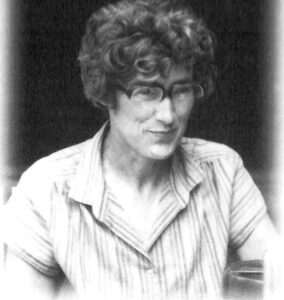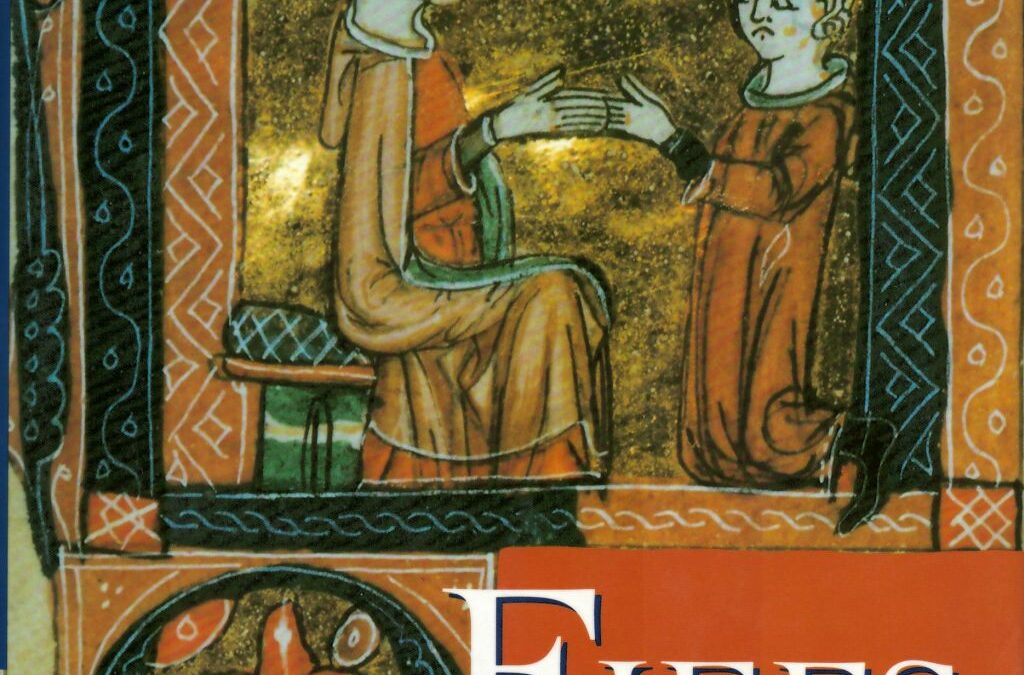
Susan Reynolds
Following on from David Bates’ blog last week, in this the second of two blogs, Pauline Stafford recalls the social media response to Susan Reynolds’ death and her contribution to the IHR.
On the day it occurred I announced Susan’s death to the medieval community on Twitter. The news spread quickly and the response was overwhelming. From the Far East to the US and from across Europe people’s reactions came in, many of them including comments and reminiscences. All were united in recognition of her importance as a scholar and of her significance for the field of medieval history. Many stressed her love of argument and discussion, but also her kindness and helpfulness. And a remarkable number focussed on her central role in the London medieval community and its base in the Institute of Historical Research.
‘Brilliant’ [Ruth Mazo Karras], ‘sharp’ [Bjorn Weiler], ‘a very great historian’ [Kay Lacey], ‘an absolute wonder’ [Jo Edge], ‘a formidable European scholar’ [Miri Rubin], ‘my model scholar’ [Levi Roach], one who ‘tease[d] the brain’ [Philippe Buc]: people appreciated her readiness to ‘challenge orthodox interpretations and assumptions’ [Andrew Prescott], and her significance in forcing all of us to pay attention to the language we use and its meanings. Unsurprisingly there was comment on her love of argument. ‘She loved intellectual sparring’ [Miri Rubin]; she was ‘someone you could have a really profitable disagreement with’ [Guy Halsall]. Thomas Kohl summed her up as ‘Eine grosse, kämpferische Historikerin’.
There were many memories of her ‘exhilarating’ conversation [Len Scales], the ‘difficult questions’ she would ask [Steven Vanderputten] – a ‘formidable questioner’ [Jane Winters], posing ‘the most probing of questions to speakers’ [Jenny Benham]. Such questioning could make her seem ‘scary’ [Vanessa King], ‘sometimes terrifying’ [Rachel Stone], projecting a ‘slightly stern exterior’ [Jenny Benham]. But over and over again the warmth and helpfulness of her personality was what remained with people:’great fun’ [Ross Balzaretti], ‘always made me laugh’ [Guy Halsall], but above all ‘very kind’ [Vanessa King], ‘warm and welcoming’ [Renee Trilling], ‘supportive’ [Anne Curry], ‘incredibly generous with her time’ [Nick Barratt].
All this chimed with my own knowledge of Susan, formed over a lifetime’s friendship – though I could never find her scary or stern. How could anyone think that who had witnessed her reduce two small boys’ bathtime to giggling chaos squirting water at them, or teaching three children how to pick up and eat cherries with their mouths alone – no hands – with personal demonstration of the technique. My husband recalls her lying on the floor, waving her arms in the air and kicking and screaming in imitation of a tantruming child to laugh them out of a sulk or bad temper. Her regular visits to our home usually involved mealtimes ending with the Oxford English Dictionary on the table – complete with magnifying glass – as we looked up and debated the developing meanings and usage of some word. History was Susan’s recreation, her leisure pursuit, as well as her work. It was never far from her mind.
I was among Susan’s first students. We arrived – in her case returned – to Oxford together in 1964. I was not her research student, but she had an enormous influence on me and on others for whom she was not a formal superviser, as was abundantly apparent in the online responses to her death. She clearly played an enormous role in the formation of young medievalists – and the IHR and its early medieval seminar were the places where she did that. ‘I got to know her at the IHR seminars’ [Rachel Stone], ‘Susan’s presence at the IHR seminar is a major memory from my PhD and showed me a great model of how historians should ask important questions’ [Katherine Cross], ‘She was so helpful and charming when I first went to the IHR seminars in the early 90s’ [Marilyn Livingstone], ‘so many generations learned from her contributions to seminar debates at the IHR’ [Laura Cleaver].
The IHR, its early medieval seminar and Susan’s life were almost a continuum – sometimes physically so. ‘She once spontaneously hosted the IHR seminar when we had to evacuate for a fire alarm – and her very tidy house was the perfect seminar room’ [Caroline Goodison], ‘I’ll never forget listening to a paper in her home after the IHR closed during protests, with Susan serving everyone sherry and peanuts’ [Alice Hicklin]. These smooth transitions were enabled by the fact that latterly she moved into a flat just around the corner, a very deliberate choice on her part.
The IHR is a centre of the Postdoc community of historians, and many first met Susan there as postdocs and benefitted from her advice, help and support. ‘She was so friendly and encouraging to a beginner medievalist’ [Richard Cassidy], ‘she offered lots of kind words and sound advice to me as a Junior Research Fellow at the IHR. Many, many others would say the same’ [Matt Raven]. Sophie Thérèse Ambler remembers Susan at the IHR ‘where she did so much to support the junior fellows and other PhD/Early Career Researchers in the development of their research and publications.’ ‘She was always warmly supportive of ECR medievalists, imparting constructive suggestions and encouragement in memorable ways.’ [Duncan Hardy] She attended every junior research fellow seminar ‘and made a point of asking a question for every paper.’ [Janel Fontaine]
All aspects of the IHR’s life interested her. She was Chair of the Friends, and on one of her visits to us in Leeds she was busy drafting a constitution for them. In typical Susan fashion this inspired thought and lively conversation about constitutions in general. She never missed a chance to think about the bigger questions.
I got to know Susan in Oxford. But she was always a Londoner, and her academic home in the last 3 decades and more of her life was the IHR – where her presence and influence underlined how central that institution is to the historical profession. The forum it provides for sociability, conversation and debate were her ideal element.
‘One of a kind, a wonderful personality’ [Rory Naismith], so many people loved her – myself among them. Leonie Hicks wrote ‘May Susan Reynolds rest in peace and rise in glory to hold rigorous seminars among the angels’. As Matthew Bennett lamented ‘Her regular question “Now what do you think that word actually means?” will no longer ring through the halls of the IHR . . .’ No longer ‘an absolutely central figure in that London community’ [Theo Riches] which finds its home there, I fear she may now be forcing those angels to mind their language.
Professor Pauline Stafford is Professor Emerita of Early Medieval History at Liverpool University, and Visiting Professor at Leeds University. Her work focuses on the history of women and gender in England from the eighth to the early twelfth centuries, and on the same topics in Frankish history during the eighth and ninth centuries; also on the Anglo-Saxon Chronicles after Alfred. Professor Stafford is a former Vice-President of the Royal Historical Society.

